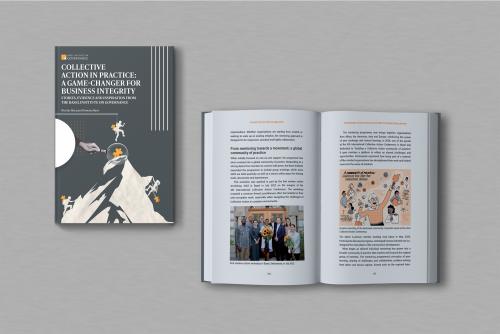Mitigating corruption risks in Ukraine's restoration: new report
Today, the Basel Institute on Governance jointly published a report with Ukraine's National Agency on Corruption Prevention and State Audit Service on corruption risks in Ukraine's civil infrastructure restoration efforts.
With damage from the Russian aggression estimated to exceed EUR 500 billion, safeguarding state and foreign donor investments in restoration projects is imperative.
The report highlights 10 key priority risks and suggests mitigation measures. These cover areas such as establishing clear prioritisation criteria for projects, improving public procurement processes and strengthening oversight for construction projects.
The report, Assessment of corruption risks in the construction, reconstruction and renovation of civilian infrastructure of Ukraine, is available here in Ukrainian on the NACP website. The Basel Institute and our Kyiv-based team contributed to its development with the support of Switzerland.
The launch event brought together key stakeholders in the restoration process, including Members of Parliament, representatives of the Ministry for Development of Communities and Territories of Ukraine, the State Agency for Restoration and Development of Infrastructure of Ukraine, the Accounting Chamber of Ukraine, the Antimonopoly Committee, the National Anti-Corruption Bureau, as well as representatives of local self-government and the private sector.
Juhani Grossmann, who leads the Basel Institute's support to Ukraine on anti-corruption, delivered introductory remarks highlighting the centrality of a robust and independent anti-corruption infrastructure to safeguard restoration funds. These are found below:
Dear colleagues, dear friends,
It is a pleasure to be with you today and discuss this crucial topic: restoring Ukraine's infrastructure and services efficiently and transparently, making the best use of limited funds.
Allow me to start by acknowledging the exceptionally challenging circumstances you operate under and my appreciation for your continued bravery in the light of seemingly impossible obstacles.
As members of the European family, your sacrifices made at the front are the investment in our collective European security. You are protecting the family, a fact which we have to treat with respect. It is my ardent hope that we will be able to honour these sacrifices by jointly building a Ukrainian future that makes today’s deprivations worthwhile.
Family members support each other, and so we at the Basel Institute seek to support you. A top priority for us is to provide the tools you need in the face of unprecedented challenges.
Those of us not in the military space provide support to the extent of our own capacity. For us at the Basel Institute, that means supporting your efforts to combat corruption – an enemy you have been fighting for decades, and an enemy that continues to have the potential to threaten your ability to mount an effective defence and restoration of your country today.
Corruption is such a complicated topic: most of us just want to wish it away, like a bad dream, but unfortunately, it continues to be a reality. That does not mean it is stagnant. Like any enemy, it adapts, mutates, strengthens or weakens, depending on how we treat it.
Ukraine’s relentless fight against corruption over the last decade has meant that you, in turn, have been able to hone your anti-corruption weapons. Conceptually similar to your relentless military innovation, you have step by step built your anti-corruption arsenal to a degree where Ukraine’s anti-corruption infrastructure – consisting of specialised agencies, decentralised corruption prevention officers, robust civil society and independent media – met some of the highest global standards and often exceeded that of Western counterparts.
There is a dedicated international standard about the independence of anti-corruption agencies, called the Jakarta Principles. This highlights the importance of ensuring independence in the appointment of the leadership, continuity in the agencies’ work and budgetary autonomy, as well as protecting employees from malicious civil and criminal proceedings.
I don't say this lightly: when I travel around the world to the countries with which I work, and tell them about the fact that you continue to robustly pursue corruption during a full-scale war, my colleagues tell me they wish they had your anti-corruption infrastructure.
We understand that this anti-corruption infrastructure is not something that was achieved easily. Rather, you had to fight for every law to remain intact, strengthen every regulation repeatedly to address residual risk, build and protect every case against obstacles, shepherd every risk assessment to the mitigation stage and then negotiate, argue, cajole and convince opponents to have these mitigation measures implemented.
I know how carefully you considered the recruitment of every detective, analyst, prosecutor and judge. And the resulting system has been impressive – a national treasure. You should be proud of it, as should all Ukrainian citizens and leaders alike. We have certainly been privileged to be associated with it.
The value of this anti-corruption infrastructure to Ukraine is not (only) sentimental. It is also of crucial importance as a counter-message to those who say – often without any personal experience or understanding of the issue – that any money or resources sent to Ukraine will only fuel corruption. It is also a crucial counter-message to russian propaganda which loves to portray Ukraine as hopelessly corrupt. You, the anti-corruption institutions, helped us build the arguments against these sceptics:
- How can Ukraine be hopeless, we argue, if it has managed to decrease corruption perceptions by 5 points between 2019 and this year, showing one of the best results in the region?
- How can Ukraine be hopeless if it manages to investigate, arrest and convict high-level corrupt officials?
- How can Ukraine be hopeless if the maturity of its anti-corruption institutions, as recently assessed by the OECD, surpasses many of those in OECD member countries?
- How can Ukraine be hopeless if it has one of the most transparent public procurement systems?
- How can it be hopeless if its public service digitalisation has drastically decreased opportunities for rent-seeking by bureaucrats?
- How can Ukraine’s restoration be hopeless if it has as sophisticated a corruption risk analysis as the one we are presenting today?
These are real-life arguments that result in real-life financial, political and military support because they confirm your responsible stewardship of the support you receive. They have allowed us to say that Ukraine is not a corrupt country; it is a country that fights corruption.
To those of you in the anti-corruption community: thank you for your hard work over the last 12 years to build and sustain this anti-corruption infrastructure against extraordinary odds.
We understand that this week’s efforts have changed the landscape drastically, but fighting corruption remains as important as ever.
Your work has been inspiring us, and we will continue to support Ukraine’s anti-corruption aspirations to safeguard this essential dimension of your national defence and restoration.




